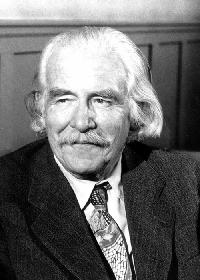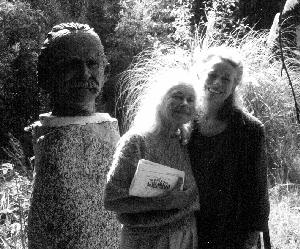

 Will Geer in "The Waltons" | Workshops would be held there for young actors and Will would provide coaching and counsel. These would not be sessions just about the theater. Shakespeare would be read and discussions held on philosophy and psychology. On Sundays, under the eucalyptus and oak tress, there would be folk singing sessions. I had the good fortune of being invited to visit the theatre by Will’s daughter, Ellen, and his ex-wife and long-time friend, Herta Ware. As we sat looking at scrapbooks, I learned the fascinating history behind Theatricum Botanicum. Born in Frankfort Indiana in 1902, William Auge Geer would, in his 76 years, have a significant impact on the American theater and make an everlasting Impression as America’s favorite grandpa, Zebulon Walton. Will’s career, which covered six decades, began in tent shows and on river boats. It was a career that included Broadway plays, movies, television, and countless Shakespearean roles as well as notable portrayals of Robert Frost, Walt Whitman and Mark Twain. |
Few fans of Will Geer know that he was caught up in the post World War Two McCarthy frenzy involving the search for communists within, among others, the entertainment industry. Called to testify before a congressional committee, Will refused to cooperate, thinking the House Committee on Un-American Affairs was an intrusion into personal liberties guaranteed by the Constitution. He, himself, was “blacklisted” and deemed a “questionable” American. As his daughter Ellen explained, “Actors have to act, you know, otherwise we dry up and blow away. Pop started a theatre for blacklisted artists in Topanga Canyon in 1951. We went from a posh Santa Monica home with Pop co-starring in films with stars like Jimmy Stewart, Donald O’Connor etc., to no work and escaping to an inexpensive home in the mountains where Pop could make his living gardening and gathering with other blacklisted actors.” The theatre performed free Shakespeare plays on a dirt stage beneath a grove of oak trees. The actors would put a sign along the road when a play was ready and invite the audience in.
| Herta Ware, Will’s ex-wife and long-time friend, in her book, “Fantastic Journey - My life with Will Geer,” describes what it was like to be blacklisted. “Being blacklisted is a special thing. I’m going to try to describe it to you. First, you must realize that you’ll never know what hit you. Your agent will smile and tell you to keep checking as work fades from both your memories. The position of importance you felt when you came into his office doesn’t exist, and the phone rings - welcome excuse - the visit is over. The money that poured into his pocket from your labor is spent or stashed away. You are now expendable. Heartless - yes, and the net is so strong you cannot penetrate it - ever. You must redirect yourself and if you have the strength and luck, you may push through in spite of all. But it is catastrophic because it involves the ego, the actor’s altogether necessary spine. |  Herta Ware and Ellen Geer |
If he or she hasn’t a philosophical turn of mind, they are lost. More than that. A firm belief in himself, his power in his craft and understanding of the twists and turns of people struggling to belong, is all a part of this precarious profession..........Many a blacklisted writer has functioned fully with his blacklisted label covered by a pseudonym. Some of the industry’s finest lived for years abroad or in the shadows, their economic survival assured. But actors, wholly dependent on their faces, voices and their whole presence, have nowhere to hide. Bravo to those who pushed on through, whose health and libido remained intact and blossomed sweeter than ever through all the manure. Infinite sadness for those who could not. They were cut off in their prime. It is one of many American Tragedies.”
The economic pressures of trying to feed a family of four and the depression that comes from not working eventually led Will Geer to New York to earn money in the theatre. The Theatre Actors Union, unlike the Screen Actors’ Guild, did not honor the blacklist and he was able to find work.
Frequently, out of hardship and adversity comes enlightenment and achievement. As I sat under the giant Eucalyptus trees at Theatricum Botanicum, I was struck by the impact that Will Geer’s portrayal of Grandpa Walton has had on the American conscience. This quintessential grandfather who was blacklisted was a dichotomy of terms. How could such a loving and caring man be ostracized by his own profession? “He was never bitter,” said daughter Ellen. “He always said people had to do what they had to do to survive.”
| He was a formidable man who stood 6-feet-2 and weighed 230 pounds and his presence was always felt. Will Geer once described himself as a folklorist, and went on to say “Which means I can’t vouchsafe for every last picayunish detail of my stories; but they’re mostly true. Mostly.” He was proud of being a lifelong agitator, a radical. “A rebel is just against things for rebellions sake. I’m a radical. Someone who goes to the roots, which is the Latin derivation of radical.” |  |
Helen Hayes once described him as “The world’s oldest hippie”. He loved to travel and feel close to the land. It was during one of his travels that he met the famous balladeer Woodie Guthrie. Will was a folk singer of some repute, and he, along with Woody Guthrie and Burl Ives, toured the country during the Depression singing mostly at government work camps. They remained close friends throughout the years.
Will said his portrayal of Grandpa Walton was a blend of Earl Hamner’s writings, himself in his 70’s and his own grandfather as he remembered him. “My Indiana boyhood was right out of The Waltons”, said Will. “Fishing in the summers. A Tom Sawyer time before the streams got all polluted. My grandfather had white hair and a white mustache. He’d been a 49er, made some gold money in California, and came back to Indiana to build the town’s first opera house. We’d go for walks and he’d say hello to the trees by their Latin names.” Soon young Will had his future planned - he would go to college and study botany. “I wanted to talk to the trees too,” said Will. “There’s one thing I neglected to take into account. All actors are born show-offs. I was a show-off.” Will went off to Chicago to study botany, but he was soon bitten by the theater and joined a touring company. He finished college, however, and went on to receive his master’s degree in botany from Columbia University.
 Entrance to the garden |  The stage at Theatricum Botanicum |
This love of the land is evident at Theatricum Botanicum. The amphitheatre is skillfully crafted out of the hillside and Will and his family planted a formal Shakespearean garden containing many of the 1,000 plants mentioned in the Works of William Shakespeare. Will’s ashes are buried in a corner of the garden. After his death, in 1978, his family continued the theatre and today it flourishes under the watchful care of Herta Ware and Ellen Geer. It has grown from a workshop to a professional repertory summer theatre producing four plays a season, an Academy of the Classics which houses year-round educational programs for children and adults at the theatre and in the Los Angeles Unified School District and a series of concerts for children of all ages called “Kid’s Koncerts.” Today the highly acclaimed and vigorous performances continue to engage audiences in a personal and intimate way. The Theatricum’s professional company offers a summer season of classics and socially relevant new plays in their recently refurbished 300 seat outdoor amphitheater created and operated by actors.
“Pops was a wonderful caring person who touched anyone who crossed his path,” said Ellen. “We miss him, but his spirit is all around the theatre, especially at Spring planting time.”

Theatricum Botanicum is located at 1419 N. Topanga Canyon Blvd. (Highway 27) outside Los Angeles between the Ventura Freeway (101) and the Pacific Coast Highway.
Their address is PO Box 1222, Topanga, CA 90290. Phone 310-455-2322
Return to The-Waltons Home Page